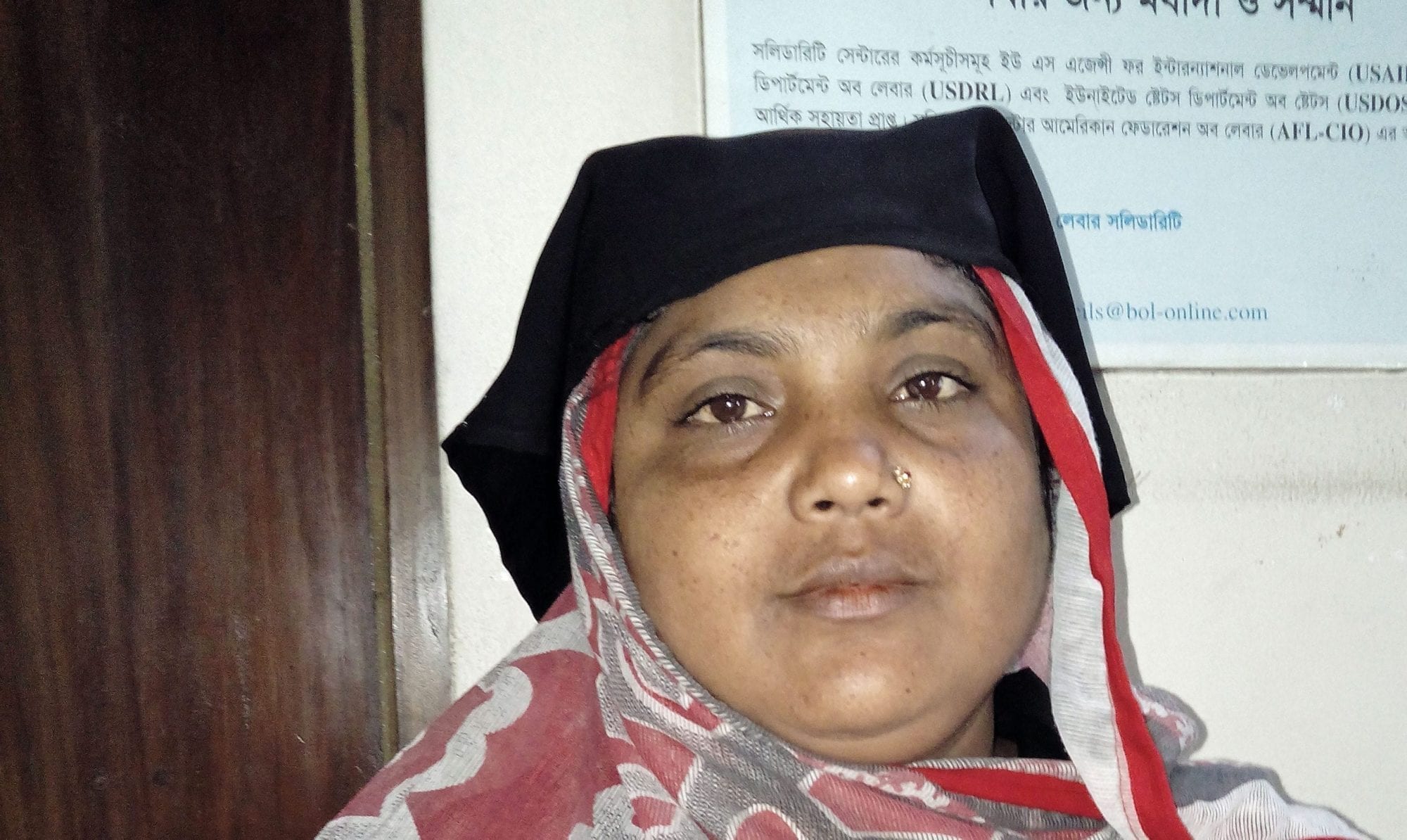
Feb 5, 2016
I am Rehana Begum. I got married at age 13. After marriage, my education stopped. Now I have two children. When my in-laws tried to arrange a second marriage for my husband, we left our village home in Paikgachha, Khulna district, where my husband was a day laborer, and moved to Khulna city with our children.
After a few different jobs, I started working at Modern (Seafood Industries) factory as an IQF (individually quick frozen) line operator and I worked there three years and a few months. Everything was going well. But suddenly one day we heard that management would soon terminate a large number of workers. Two days later, we saw a notice on the factory’s main gate listing the names of workers selected for layoff. Management told us this is only the first phase.
The second list was soon posted, in August 2015. We were worried, wondering when our names would appear on the list. On September 11, I heard from one of my colleagues that I was terminated, but I didn’t believe it as there was not any notice. Finally, I heard from the office that I was terminated along with 30 other workers—but management didn’t give us any written documents.
Standing Strong Together
The next day, all of us who had been terminated—about 50 workers from two factories (Bright and Modern)—met in the home of a worker. From this home meeting we decided to meet with our factory owner. We selected and assigned eight workers, four from each factory, on behalf of all workers. I was one of them and all of us got training from the Solidarity Center and learned about our rights. If we failed in the negotiations with owner, we knew we could go to the Solidarity Center for legal help.
As per our plan, we went to the factory office to meet the manager. At first, managers selected two workers out of eight and offered them all legal payments. But we were strongly united, and they could not break us. The two workers came out of the factory and shared everything with us and all the workers became angry and some of them became violent and started shouting. But we stopped them and requested that everyone stay peaceful.
Meanwhile, watching the situation, the owner suddenly changed his mind and asked all workers to come inside the factory. The owner called one worker from each factory to list demands. I said we came to you for justice, for our legal rights. We want our service benefit. We were terminated without any notice when Eid-Ul-Azha (a four-day Muslim religious holiday) is coming.
After the meeting, management assured us it will try to give all workers service benefits within one week. I received Tk. 18315 ($234). Soon, all terminated workers got their payments. It was really a great victory for us.
I have been working in Jalalabad Frozen Food Ltd. as an IQF line operator since October 2015. After working these couple of years as a shrimp processing plant worker, I now feel more confident and feel myself stronger than ever. I am also happy with my family. My husband works as a day laborer and helps me doing my job. My children are studying in school.
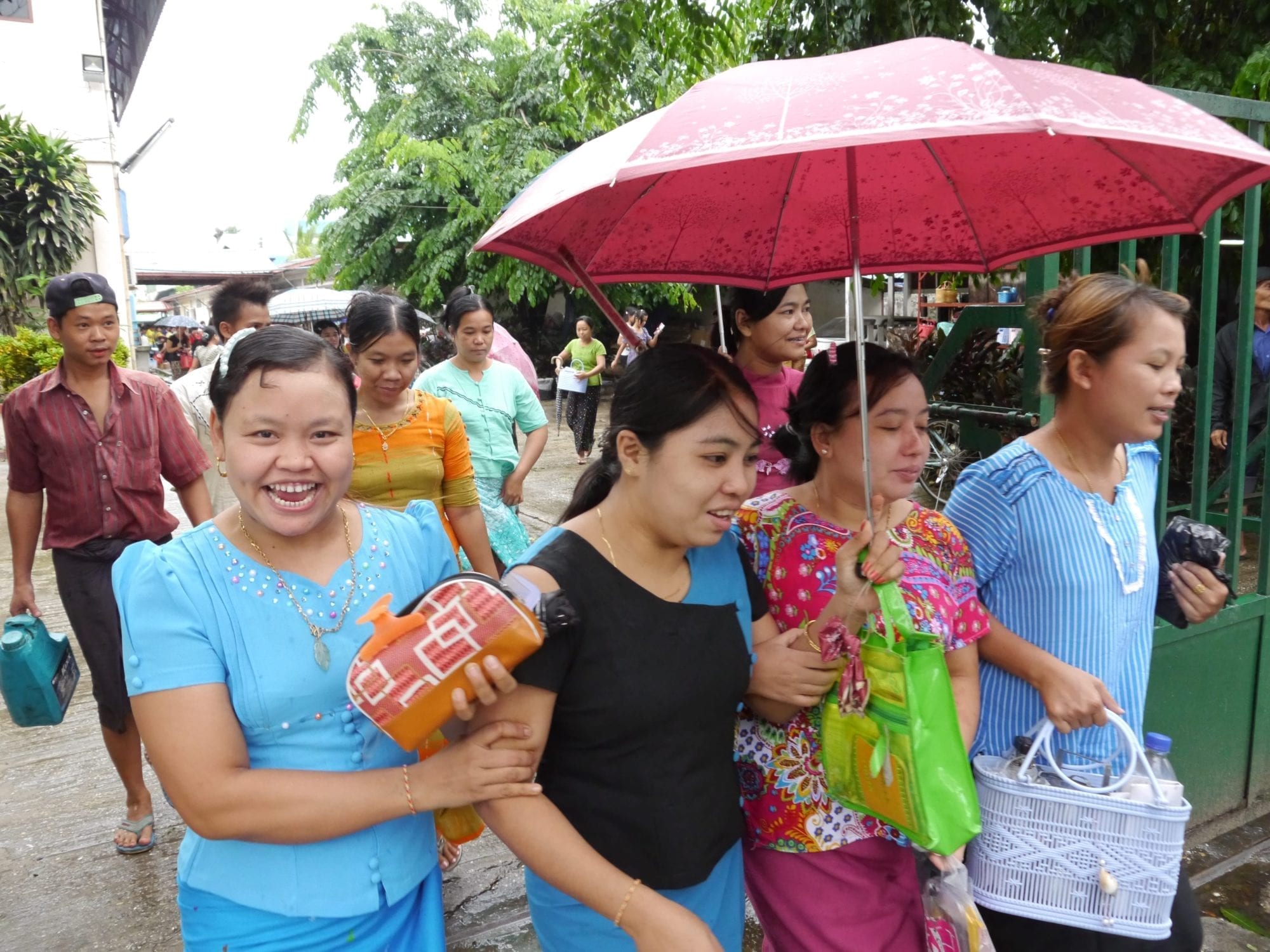
Jan 6, 2016
Whether building a towering office building in downtown Zimbabwe, sewing garments in a Bangladesh factory or digging for phosphate in Mexico mines, the world’s unsung working people demonstrate, time and again, the dignity of work. Here, we celebrate some of the amazing women and men we partnered with in 2015, and showcase their efforts to improve their lives and livelihoods and tip the scales toward greater equality in their countries.
As Mervat Jumhawi, a former garment worker and union organizer working with the Solidarity Center in Jordan, described her own experience: “When I became member of the union, I became stronger.”
[portfolio_slideshow id=6893]
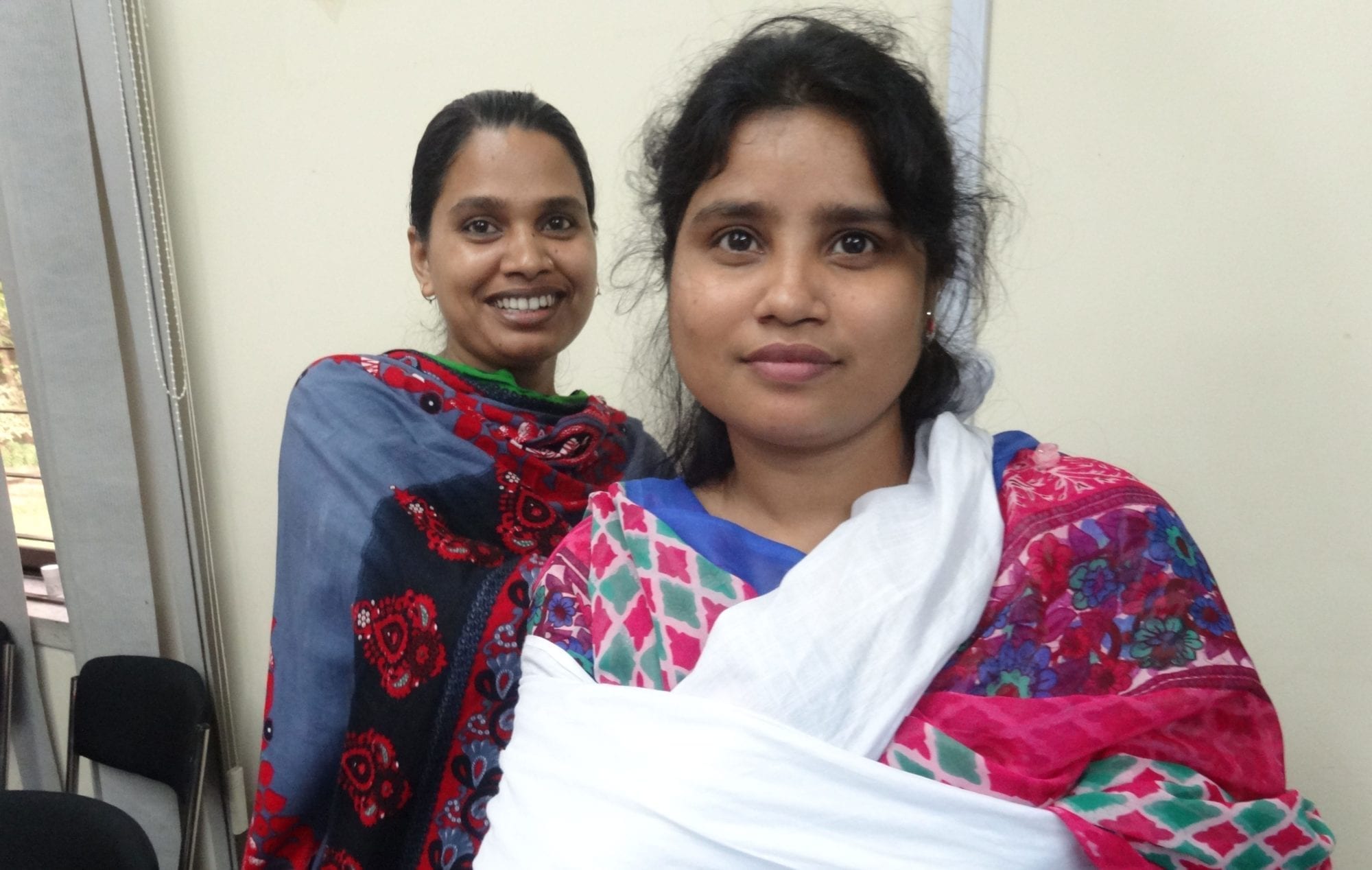
Nov 19, 2015
Bilkish Begum says she and other workers at a garment factory in Bangladesh could not discuss implementing fire safety measures with their employer—even after the deadly blaze at Tazreen Fashions factory killed 112 workers three years ago next week. Only when they formed a union, which provides workers with protection against retaliation for seeking to improve their workplace conditions, could they take steps to help ensure their safety.
“Things have improved a lot regarding fire safety once we formed union as now we have the power to raise our voice,” she says.
Bilkish, 30, now a leader of a factory union affiliated with the Sommilito Garments Sramik Federation (SGSF), is among hundreds of garment workers who have taken part in Solidarity Center fire safety trainings this year. The Solidarity Center works with garment workers, union leaders and factory management to improve fire safety conditions in Bangladesh’s ready-made garment industry through such hands-on courses as the 10-week Fire and Building Safety Resource Person Certification Training.
“I used to be afraid about fire eruption in my factory,” Bilkish says. “But after attending trainings, I feel that if we work together, we can reduce risk of fire in our factory.”
Fire remains a significant hazard in Bangladesh factories. Since the Tazreen fire, some 34 workers have died and at least 985 workers have been injured in 91 fire incidents, according to data collected by Solidarity Center staff in Dhaka, the capital. Incidents resulting in injuries include at least eight false alarms.
In January, after a short-circuit caused a generator to explode at one garment factory, Osman, president of the factory union and Popi Akter, another union leader, quickly addressed the fire and calmed panicked workers using the skills they learned through the Solidarity Center fire training. They also worked with factory management to correct other safety issues, like blocked aisles and stairwells cramped with flammable material.
Many workers who have taken part in the trainings say they are equipped to handle fire accidents.
“We are now confident after the training that we can help factory management and other workers if there is any incident of fire in our factory,” says Mosammat Doli, 35, a leader of a union affiliated with the Bangladesh Garment and Industrial Workers’ Federation (BGIWF).
“From my experience at my factory, I have seen that an effective trade union can ensure fire safety in the factory as it can raise safety concerns,” he said.
Fewer than 3 percent of the 5,000 garment factories in Bangladesh have a union. And according to the International Labor Organization, 80 percent of Bangladeshi garment factories need to address fire and electrical safety standards. Yet, despite workers’ efforts to form organizations to represent them this year, the Bangladeshi government rejected more than 50 registration applications—many for unfair or arbitrary reasons—while only 61 were successful. This is in stark contrast to only two years ago, when 135 unions applied for registration and the government rejected 25 applications, and to 2014, when 273 unions applied and 66 were rejected.
Without a union, workers often are harassed or fired when they ask their employer to fix workplace safety and health conditions.
Because his workplace has a union, which enabled Doli to participate in fire safety training, he—like Osman and Popi Aktee—already has potentially saved lives. Together with other union leaders, he helped evacuate workers and extinguish a fire in their garment factory.
Shahabuddin, 25, an executive member of his factory union, which is affiliated with SGSF, is among Bangladesh garment workers who see firsthand how unions help ensure safe and healthy working conditions. He says his workplace had no fire safety equipment—until workers formed a union and collectively raised the issue of job safety.
“Now management conducts fire evacuation drills almost regularly. We did not imagine it just a few years back. As we formed union, many things started changing,” he says.
Mushfique Wadud is Solidarity Center communications officer in Bangladesh.
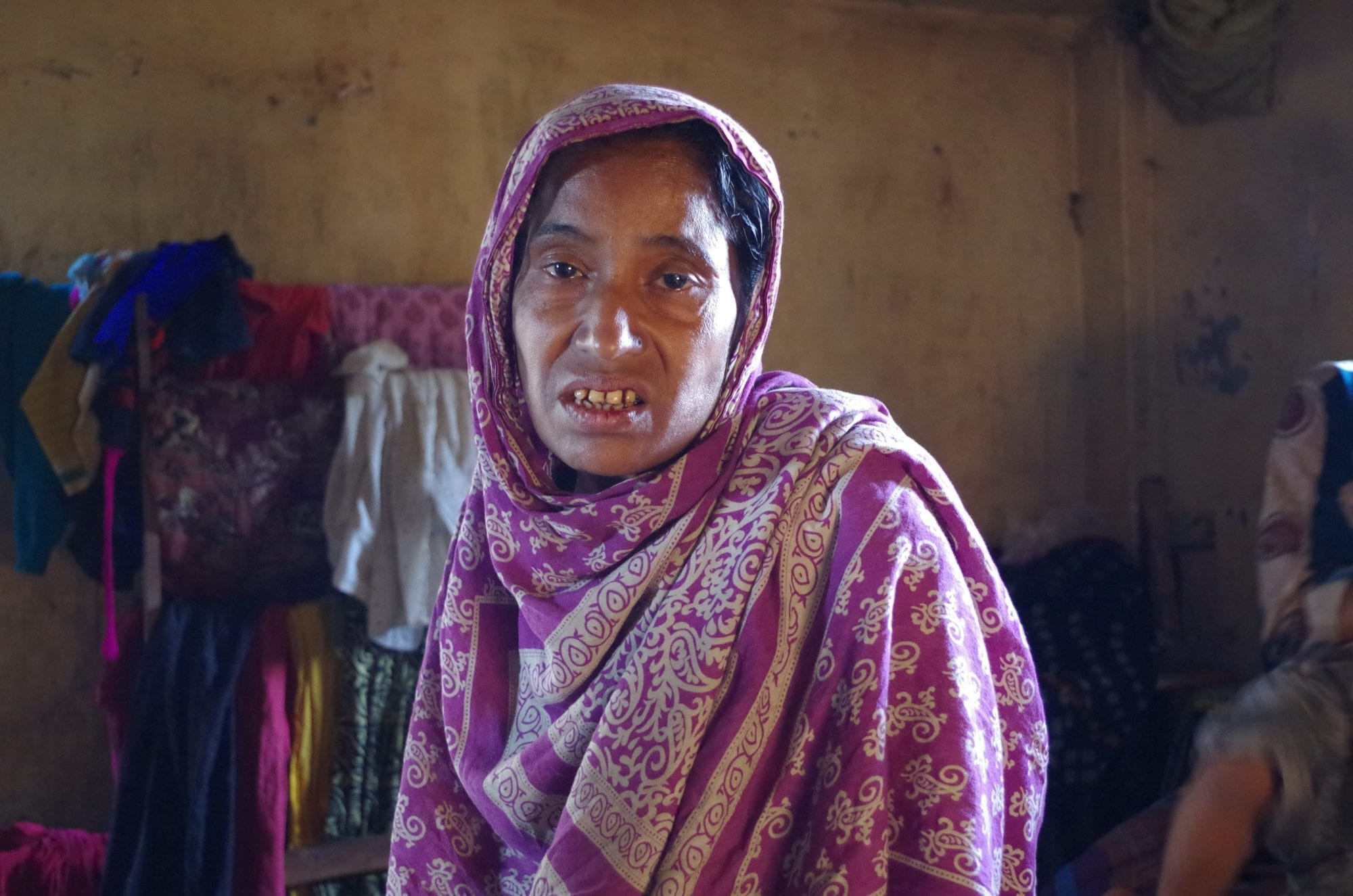
Nov 19, 2015
“You have forgotten the Tazreen fire incident but our actual suffering has just started,” says Anju, who experienced severe head, eye and other bodily injuries during the fatal Tazreen Fashions Ltd. fire in Bangladesh that killed 112 garment workers.
Survivors of the November 24, 2012, Tazreen fire who recently talked with Solidarity Center staff in Bangladesh say they endure daily physical and emotional pain and in many cases, have little or no means of financial support because they cannot work. Some, like Anju, who is unable to work, have never received compensation for their injuries.
Bangladesh’s $25 billion garment industry fuels the country’s economy, with ready-made garments accounting for nearly four-fifths of exports. Yet many of the country’s 4 million garment workers, most of whom are women, still work in dangerous, often deadly conditions. Since the Tazreen fire, some 34 garment workers have died and 985 have been injured in 91 fire incidents, according to data collected by Solidarity Center staff in Dhaka, the capital.
Some 80 percent of export-oriented ready made garment (RMG) factories in Bangladesh need improvement in fire and electrical safety standards, despite a government finding most were safe, according to a recent International Labor Organization (ILO) report.
The Solidarity Center has had an on-the-ground presence in Bangladesh for more than a decade. Through Solidarity Center fire safety trainings for union leaders and workers, garment workers learn to identify and correct problems at their worksites. But fewer than 3 percent of the 5,000 garment factories in Bangladesh have a union. ” Despite workers’ efforts to form unions, in 2015 alone the Bangladeshi government has rejected more than 50 registration applications—many for unfair or arbitrary reasons—while only 61 have been successful. The rejections have jumped significantly from 2014, when 273 unions applied and 66 were rejected.
So that the world does not forget, here is the story of Anju and others who survived the Tazreen fire.
Photos: Solidarity Center/Mushfique Wadud
[portfolio_slideshow id=6745]
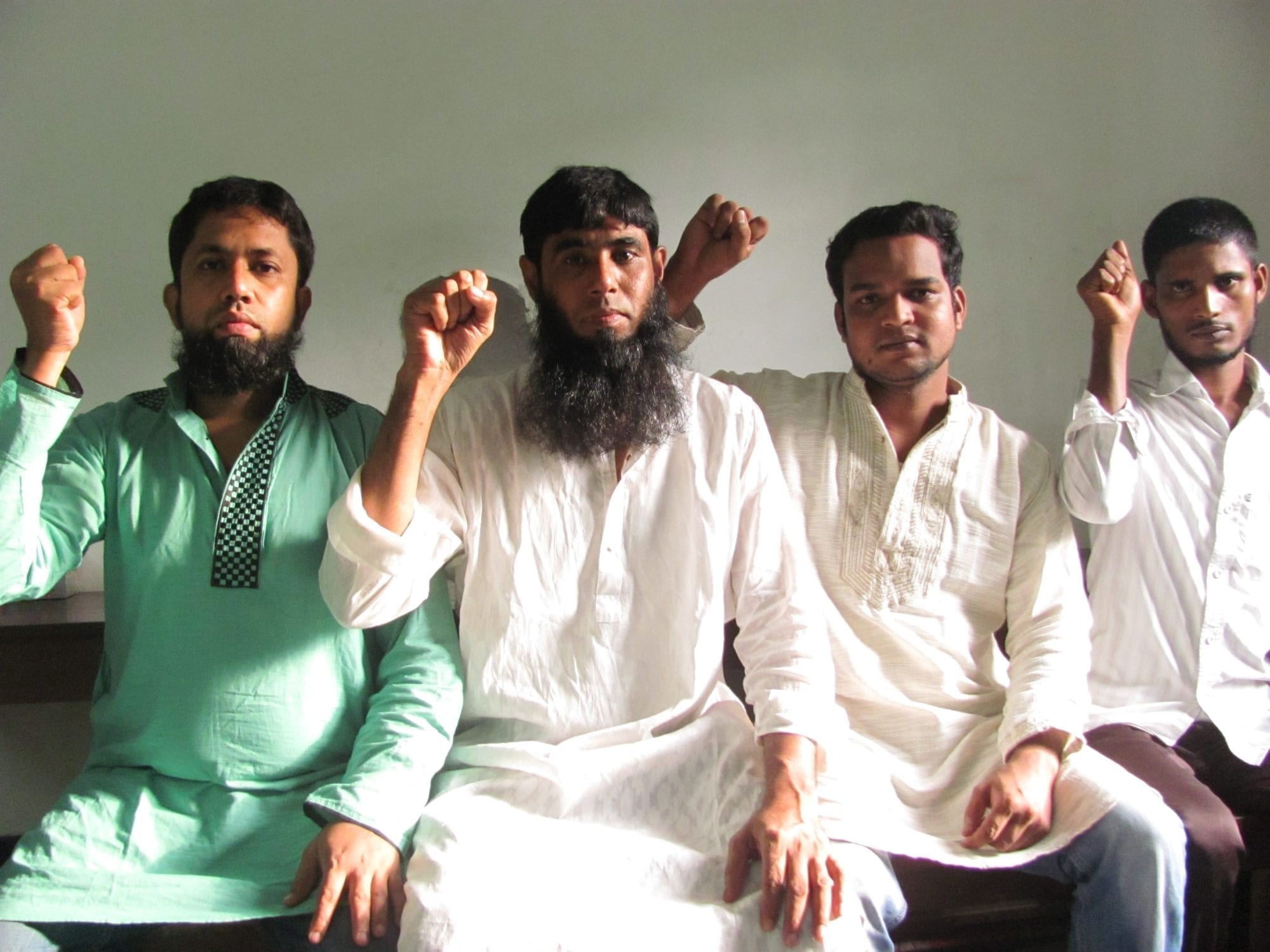
Sep 2, 2015
Garment workers at Sin Sin Poly factory in Bangladesh’s export processing zone (EPZ) won increased pay and leave benefits in August after forming a workers’ welfare association and successfully negotiating with management.
Mehedi Hasan, 35, was among workers helping form the association. When Mehedi began work at the factory, where he was hired to make plastic and polyethlene bags, he says instead he was asked to perform janitorial duties.
“That disappoints me a lot. Though I was appointed as a factory worker, I was asked to clean the factory. There were other problems as well,” he says.
“From that day, I promised to myself that I would work for a change in the factory,” Mehedi added.
Staying Strong to Form Their Association
Mehedi joined with Dalim Sarkar, 30, Russel Sarkar, 28, and Mohammad Alamin, 25, and other workers to form a Workers’ Welfare Association to represent the 100 workers in the factory, formerly called Ju Hyung Co. Ltd.
“The initial stage (involved much) struggling,” says Dalim Sarkar, association secretary. “We had to work hard to convince other workers about the benefit of a (Workers’ Welfare Association).”
“We are now getting increased money for our meal and transportation,” said Alamin.
Garment worker Russel Sarkar said that under the agreement, workers also will receive paid leave for the first time. Some workers have begun to receive performance promotions, a practice the company had ended.
In Bangladesh’s ready-made garment industries, workers often face abusive employers, low pay and unsafe working conditions. EPZ workers cannot form unions. However, in 2004, Bangladesh passed a law passed enabling workers in the special zones to form workers’ associations.
Associations are permitted to represent workers in disputes and grievances, negotiate collective bargaining contracts and collect membership dues, but cannot affiliate with labor unions, nongovernmental organizations or political organizations outside of the EPZ.
“Now other factories in the EPZs are inspired by us,” Dalim says. “If there is a federation in EPZ, our fight for workers’ rights will be easier,” he added.
Workers Associations Spreading
Despite obstacles, more workers are forming associations in factories throughout Bangladesh’s export processing zones. Associations now represent workers at 53 of the 102 factories in the Dhaka EPZ alone.
Bangladesh derives 20 percent of its income from exports created in the EPZs, which are industrial areas that offer special incentives to foreign investors like low taxes, lax environmental regulations and low labor costs. Some 405,166 workers, the vast majority of them women, work in 437 factories in Bangladesh’s eight EPZs.
The Solidarity Center holds trainings for garment workers on labor law and union rights and strategic planning and leadership development. The Solidarity Center also mentors union organizers and workers welfare association leaders and helps workers resolve workplace issues.





